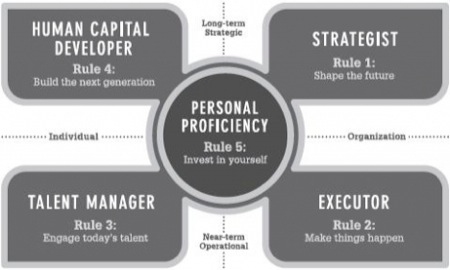Dave Ulrich, Norm Smallwood and Kate Sweetman have developed what they believe is “a comprehensive framework about what leaders do and why they do it.” Using a qualitative analysis of the literature on leadership, they synthesized large numbers of frameworks, tools, processes, and studies of leadership and then identified the essential rules that govern what all great leaders do.
I found their “rules” helpful, particularly in the way it highlighted the “development and multiplication of leaders”–a characteristic or mark of all the literature on movement building. It also reinforces some of my current reading and research about “self-differentiation” in the leader (see previous posts).
Here are the five rules–as you read them, use them first to evaluate your own leadership. Then discuss them with your team, asking, how are we doing in each of these five areas.
1: Shape the future. Leaders answers the question “where are we going?” and make sure that others understand the direction as well. Leaders are strategists and practical futurists. They figure out what the organization needs to succeed and map the direction they must go based on current and planned resources. They work effectively with others to figure out how to get from the present to the desired future. They manage the paradox of being open-minded about the possibilities while also staying rooted in reality.
2: Make things happen. How will you make sure you get to where you’re going? If you are a leader that makes things happen, then you are an executor (as in, one who executes). Executors translate strategy into action. They put systems in place that help others do the same. They focus on getting things done. Good leaders ensure a clear line of sight between the short term and the long term. They meet promises by taking action.
3: Engage today’s talent. Effective leaders know how to engage others to get immediate results by drawing the right talent close: communicating well, and connecting the individual to the mission. They are in a way talent managers, generating intense personal, professional and organizational loyalty. They understand what skills are required to carry out their mission, and they know how to attract the right talent to their organization.
4: Build the next generation. Who stays and sustains the next generation? Leaders with this focus are human capital developers. They ensure long-term leadership development and focus on assuring the growth and progress of their organization. They can spot future talent and understand how to develop those who possess it.These leaders work to build a cadre of people with the longer-term competencies for strategic success. They create a workforce plan focused on future talent, develop that talent, and help the talented leaders find a future in their organization.
5: Invest in yourself. Great leaders always ask themselves: “Am I prepared for what’s next?” They invest in themselves by constantly learning. Leaders are learners: they learn from their successes and from failures, they read books, take classes and learn from life itself. “Effective leaders inspire loyalty and goodwill in others because they themselves act with integrity and trust.” They are decisive and have a passion for making bold and courageous moves.

Leave a Reply